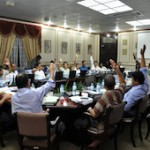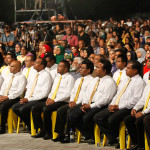The US Embassy in Colombo has announced a US$2.5 million election assistance program in the Maldives, to be implemented over the next 18 months.
According to a statement from the embassy, the program will “promote an open, democratic election by increasing civic participation… promote the integrity of the electoral process in the Maldives in advance of the September 2013 elections, and the subsequent local council and parliamentary elections.”
Speaking of the launch, US Ambassador Michele J Sison said the program would seek to ensure “that all Maldivians participate in credible, transparent and inclusive elections.”
According the statement, the program will be implemented by the International Foundation for Electoral Systems (IFES) with Maldivian partners Transparency Maldives and the Raajje Foundation.
“The program aims to support the election process through resolution of disputes and voter education. This assistance will provide national and regional forums for dialogue with policy makers and civic leaders as well as dispute resolution and mediation training for community leaders,” the US Embassy stated.
“For Maldivian citizens, the program will launch a public awareness campaign to promote political reconciliation and a free and fair election. In addition, civic and voter education programs will provide training and grants for community based organisations to increase citizen participation and improve voter education across the atolls,” the statement added.
The US election assistance comes on the back of an extensive pre-election assessment published by Transparency Maldives ahead of the September 7 elections, highlighting vote-buying, political polarisation, and credibility as key challenges.
The elections were set to unfold “against a context of uncertainty, crises of political legitimacy and unprecedented levels of political polarisation”, Transparency stated.
Political polarisation in the Maldives has grown in the wake of the failed all-party talks and events of February 7, leading to bitter mistrust between political factions and the pervading sense among parties that the loss of the upcoming elections “could amount to losing everything”.
“Political polarisation is characterised by mutual mistrust and radical negative categorisation of people, politicians, political parties and, sometimes, entire institutions,” Transparency noted.
“It’s characterised by the lack of self-reflective criticism, by the failures to hold one’s own self and party to account, and the inability to listen to and compromise for the callings of the other side. It’s also characterised by an apparent struggle for political power as a bitter zero-sum game.”
Particular challenges around polarisation include a “lack of cooperation and dialogue among major political parties, opening up space for intolerance and violence”, “a possibility of contestation of elections results, especially if the victory is through a narrow margin”, and the risk that even if the election results are respected, “a significant segment of the polity might reject the incoming president as the representative for all the people in the true democratic spirit required in defeat.”
Transparency called for restraint among parties, appealed for policy debates, and extensive and long term observation on behalf of the international community.
The country’s two largest parties have meanwhile turned their focus to campaigning, with the Progressive Party of the Maldives (PPM) annoucing Home Minister Dr Mohamed Jameel as running mate of presidential candidate Abdulla Yameen – half-brother of former autocratic leader of 30 years, Maumoon Abdul Gayoom.
The opposition Maldivian Democratic Party (MDP), headed by former President Mohamed Nasheed, has claimed it has been pledged 125,000 votes during its door-to-door campaigning, a figure which if correct would translate to 61 percent of the vote assuming a 2008-levels of voter turnout (~85 percent).
Key factors affecting the September election will include widespread and heavily polarised sentiment surrounding the February 2012 transfer of power, and the preferences of 31,000 new young voters – a 15 percent increase on the number of eligible voters compared with the 2008 presidential election.






Let this be a reminder why it's not a good idea to tell countries to "mind their own business", without the assistance of foreign countries the Maldives would have nothing.
i think the entire Maldives will vote for Fili Nasheed. The people who voted for another candidate will not be a Maldivian.
All the election which happened after 7th Feb. 2012 were voted by foreigners and that is why MDP was not able to win.
Even recent election at Kendhikolhudhoo, Fili Nasheed had made to win with the first round but foreigners voted . That is why they lost on the first round.
Issue - donor government gives grant to local NGOs to carry out programs targeted towards the upcoming election.
Is this legal? Yes. Maldivian laws allow local NGOs to accept foreign government funding.
My opinion? Given the dearth of local sources to acquire funds, foreign assistance seems to be the only real avenue open to local NGOs to carry out their activities. It would also save the NGOs from appearing to be biased towards a local political party. However in some circles there would be concerns over donor influence over the reports and statements issued by the NGOs. Overall, the lesser of two evils appears to be the benefits from a voter education program and elections-monitoring program. Our infant Elections Commission could also learn from observing how the two NGOs carry out their work.
Raajje Foundation is run by leaders of the current government. It can never be fair. Also the locals who run TM have been called out for their role in legitimizing the 2012 coup.
And what might the United States be trading on getting from the Maldives, in return for its USD 2.5 million investment?
A "lily-pad" and a "coconut grove"?
http://indrus.in/blogs/2013/05/08/americas_coconut_grove_lily_pad_in_maldives_24665.html
Always nice to know my country's government has extra money to spend on foreign elections, when we can't even provide healthcare to our veterans, or properly COLA adjusted pensions to our elderly.